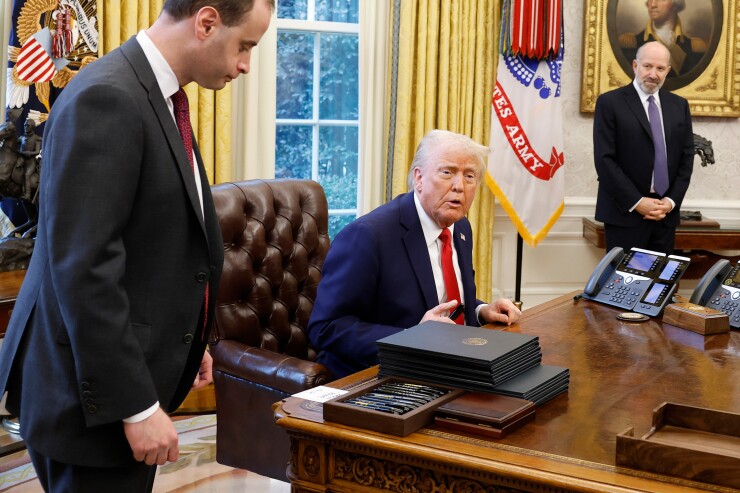President Donald Trump is once again saying he wants to end a tax perk used by private equity fund managers, a policy feat that politicians have tried and failed to achieve for more than a decade.
Under threat: the Tax Code's controversial treatment of the profits of private equity, venture capital and hedge fund managers. In the current regime, dealmakers pay a lower rate on their share of profits because these returns are taxed as capital gains instead of normal employment income.
In a meeting with Republican lawmakers on Thursday, Trump
"President Trump will give us his priorities, but I can tell you the real priority is fixing this affordability crisis for the American people," Treasury Secretary Scott Bessent said in an interview with Saleha Mohsin on Bloomberg Television Thursday. Administration officials were "just starting the process now" on tax policy, he said.
Trump rode a wave of economic populism and widespread grievance about the cost of living into the White House, putting him on a collision course with a multitrillion-dollar industry that has built a slick lobbying machine around how it fuels jobs and growth.
Both Democratic and Republican presidents have attempted to abolish the carried interest loophole, including President Joe Biden in 2022, but private equity interests have mounted fierce opposition.
In the upcoming fight, the industry is expected to continue drawing on a playbook that has been honed over the years and argue that the current tax treatment of private equity profits is appropriate for a commitment of "sweat equity" with no guarantee of returns.
In past fights, buyout giants have aggressively highlighted how their industry fueled mom-and-pop businesses in recent years. Private equity firms have taken senators to tour the businesses in their home states, making clear that jobs and local taxes were at stake. They've found private equity allies in organizations like the National Association of Manufacturers.
"Private equity firms have worked to show carried interest aligns the interests of investors and managers," said
Vast sums
There are vast sums of money at stake. The largest publicly traded private equity firms, such as Apollo Global Management Inc., Blackstone Inc., Carlyle Group Inc. and KKR & Co., are sitting on billions of dollars of investments that are eligible for carried interest.
KKR reported
For partners at these firms, carried interest makes up a growing portion of their compensation. KKR, Apollo and Carlyle have changed their pay structures in recent years to allocate more of the carried interest to their investment professionals while leaving more of the fee revenue to public shareholders.
Shares of some of the biggest private equity firms swooned after Trump's comments were made public, before paring the declines. KKR was the worst performer of the group, sliding 1.4%.
Prior efforts
Still, Trump's latest attack on carry isn't surprising.
In a
A 2017 tax proposal split Trump's top advisers, and changing how carried interest was taxed was ultimately
Congressional tax writers
Today, a substantial amount of what hedge fund executives earn doesn't qualify for being taxed as carried interest. That's because they typically make short-term bets rather than sit on harder-to-sell investments.
Burgeoning fight
White House Press Secretary Karoline Leavitt also told reporters on Thursday that Trump
In recent years, some of the biggest private equity firms have made big changes that tie pay more closely to how much dealmakers earn — making them more exposed to any changes that could affect carried interest.
KKR
The industry is leaning in on its fight.
"Ending carried interest would harm American businesses, capital markets, and the U.S. economy," Jillien Flores, head of global government affairs at the Managed Funds Association, which lobbies on behalf of alternative asset managers, said in a statement.
The American Investment Council said that it encouraged the Trump administration and Congress to keep "sound tax policy in place and unleash more long-term investment that supports jobs, workers, small businesses, and local communities."






